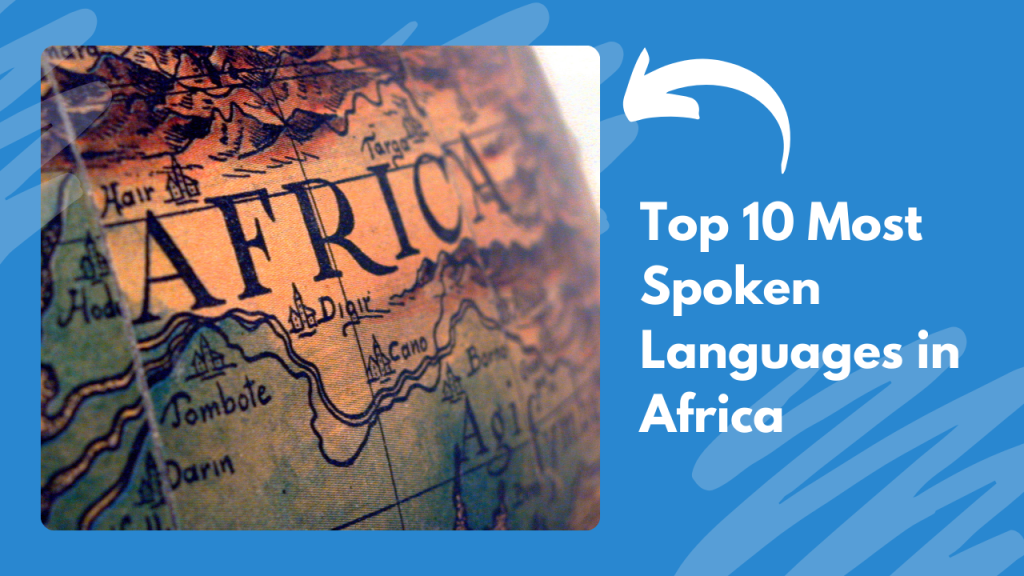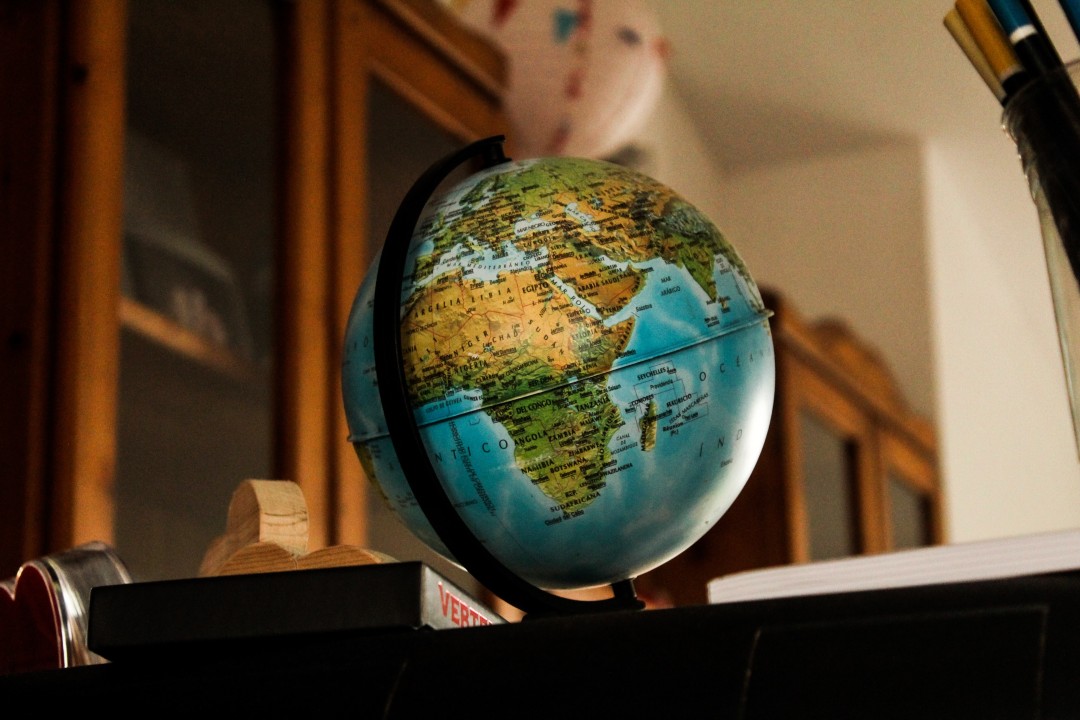
Africa is home to a rich array of languages, reflecting its diverse cultures and histories.
In this article, we will delve into the top 10 most spoken languages on the continent, offering you a glimpse into the languages that resonate in the lives of millions of people daily.
Join us as we explore the languages that dominate communication in Africa, understanding their prevalence and the role they play in various communities.

Africa is a continent bursting with diversity in every aspect, including its languages. In fact, there are over 2,000 languages spoken across this vast and beautiful land.
These languages belong to different language families, each with its own unique characteristics and sounds.
| No. | Language | Speakers | Region |
| 1 | Arabic | Over 300 million | North Africa, parts of East Africa |
| 2 | Swahili (Kiswahili) | Approximately 100 million | East Africa (Kenya, Tanzania, Uganda) |
| 3 | Hausa | Around 80 million | West Africa (Nigeria, Niger, Ghana) |
| 4 | French | Approximately 80 million | North and West Africa, Central Africa, and parts of East Africa |
| 5 | Amharic | About 30 million | Ethiopia |
| 6 | Yoruba | Over 20 million | Nigeria, Benin, Togo |
| 7 | Igbo | Around 24 million | Nigeria |
| 8 | Zulu | Approximately 27 million | South Africa (KwaZulu-Natal) |
| 9 | Oromo | About 35 million | Ethiopia, Kenya, Somalia |
| 10 | Somali | Over 20 million | Somalia, Djibouti, parts of Ethiopia and Kenya |
| 11 | Portuguese | Approximately 30 million | Angola, Mozambique, Cape Verde, Guinea-Bissau |
| 12 | Tigrinya | Around 7 million | Eritrea, parts of Ethiopia |
| 13 | Rwanda-Rundi (Kinyarwanda/Kirundi) | About 20 million | Rwanda, Burundi, Uganda, and parts of the Democratic Republic of Congo (DRC) |
| 14 | Berber (Tamazight) | Over 25 million | North Africa (Morocco, Algeria, Tunisia, Libya) |
| 15 | Sudanese Arabic | Approximately 30 million | Sudan |
| 16 | Kongo (Kikongo) | Around 10 million | Democratic Republic of Congo (DRC), Republic of Congo, Angola |
| 17 | Shona | Over 10 million | Zimbabwe |
| 18 | Chichewa (Chewa/Nyanja) | About 12 million | Malawi, Zambia, Mozambique |
| 19 | Amazigh (Berber) | Around 15-25 million | North Africa (Various countries) |
| 20 | Tsonga | Approximately 12 million | South Africa (Limpopo Province), Mozambique |

Arabic, a prominent Afroasiatic language, holds a substantial presence in Africa, with over 280 million speakers.
It predominantly thrives in North Africa and parts of East Africa, making it a key language for both cultural and religious reasons, as it is the language of the Quran and a vital element of Islamic identity.
Arabic's rich history in North Africa, including countries like Morocco, Algeria, Tunisia, Libya, and Egypt, has deeply influenced the region's culture, art, and literature, contributing to a unique linguistic and historical tapestry that is an integral part of Africa's diverse linguistic landscape.
If you are interested in learning this language, have a look at our complete guide on How to learn Arabic.
French holds a prominent presence in Africa as a result of historical colonial ties, with approximately 167 million speakers across the continent.
Primarily concentrated in North and West Africa, Central Africa, and parts of East Africa, French is an official language in numerous African countries. It plays a pivotal role in education, government, and business, offering opportunities for international communication and diplomacy.
Beyond its utilitarian functions, French is a path for African artistic expression, literature, and cultural exchange, reflecting the continent's rich blend of languages and cultures and serving as a bridge between Africa and the French world.
Swahili, also known as Kiswahili, is a widely spoken Bantu language primarily found in East Africa, with approximately 100 million speakers.
Renowned for its simplicity and versatility, Swahili serves as a linguistic bridge in the region, fostering communication among people from diverse ethnic backgrounds and countries like Kenya, Tanzania, and Uganda.
With its rhythmic and melodious sounds, Swahili is not only a tool for practical communication but also a vibrant expression of East African culture, art, and heritage, making it an enticing language for both learners and admirers of African linguistic diversity.
Hausa is a widely spoken Chadic language with approximately 63 million speakers primarily concentrated in West Africa, particularly in Nigeria, Niger, and Ghana.
Known for its historical significance as a language of trade and administration, Hausa serves as a unifying linguistic force in the region. Its straightforward grammar and pronunciation, as well as its use of the Latin script, make it accessible to learners.
Hausa is not only a means of communication but also a vehicle for preserving the rich cultural heritage of the Hausa people, expressed through vibrant music, literature, and traditional ceremonies, making it a compelling choice for language enthusiasts interested in West African culture and communication.
Yoruba, spoken by over 45 million people mainly in Nigeria, Benin, and Togo, is a Niger-Congo language renowned for its intricate tonal system and cultural significance.
It serves as a pillar of Yoruba identity, with deep connections to religion, folklore, and art. The Yoruba people's rich history is woven into their language, which has influenced various African diaspora communities, particularly in the Americas and the Caribbean.
Yoruba's complex verbal and nominal structures make it a linguistic treasure trove for those interested in African languages, offering a window into the vibrant and diverse culture of the Yoruba people and their descendants worldwide.
Igbo, spoken by approximately 44 million people in southeastern Nigeria and diaspora communities, is a Niger-Congo language celebrated for its complex system of tonal pronunciation and its significant role in the cultural tapestry of the Igbo people.
The language incorporates the heart of Igbo identity, reflecting their traditions, worldview, and oral history. Igbo's nuanced vocabulary and grammatical structures reveal a deep connection to Igbo cultural practices, folklore, and philosophy.
Learning Igbo is not just about acquiring a new language but delving into a rich and diverse heritage, making it a captivating choice for those interested in exploring the traditions and linguistic intricacies of this vibrant African culture.
Oromo, spoken by approximately 36 million people, primarily in Ethiopia but also in parts of Kenya and Somalia, is a prominent Afroasiatic language that holds a central place in Oromo identity and heritage.
With a rich oral tradition, Oromo culture, history, and worldview are intricately woven into the fabric of the language. Oromo's phonology and grammar offer linguistic depth and diversity, and it is written in both Latin script and Ethiopic script.
Learning Oromo provides a unique opportunity to explore the rich cultural expressions, music, literature, and historical narratives of the Oromo people, who constitute one of Africa's largest ethnic groups and continue to play a significant role in the region's social and political landscape.
Amharic, the official language of Ethiopia, boasts approximately 22 million speakers in Ethiopia and diaspora communities.
This Semitic language, distinguished by its unique script, Ge'ez, is deeply intertwined with the country's history, culture, and religion, particularly the Ethiopian Orthodox Tewahedo Church.
Amharic's status as a unifying language across Ethiopia's diverse ethnic groups is vital, and its rich literary tradition includes religious texts, poetry, and historical documents.
With its distinctive sounds and script, learning Amharic offers a gateway to understanding Ethiopia's rich heritage, making it an appealing choice for those eager to explore this ancient and culturally diverse nation.
Somali, spoken by over 20 million people primarily in Somalia, as well as in Djibouti, parts of Ethiopia, and Kenya, is an Afroasiatic language characterized by its distinctive script, known as the Osmanya script or Latin script, and its integral role in Somali identity and culture.
With a rich oral tradition and a poetic heritage, Somali language and literature have flourished for centuries, serving as a repository for historical narratives, folklore, and expressions of Somali heritage.
Learning Somali not only provides access to a fascinating linguistic structure but also a deeper connection to the resilient Somali people and their unique cultural contributions to the Horn of Africa and the global Somali diaspora.
These languages represent just a fraction of the linguistic diversity found in Africa. Each language has its own unique history, culture, and significance in its respective region.
Learning any of these languages can be a rewarding experience, offering insight into the rich tapestry of African cultures.
Zulu, spoken by approximately 13 million people primarily in South Africa's KwaZulu-Natal province and neighboring regions, is a Bantu language known for its distinctive click sounds, rich oral traditions, and vibrant cultural heritage.
As one of South Africa's official languages, Zulu plays a crucial role in the country's linguistic landscape. Its unique phonology, which includes various click consonants, makes it linguistically fascinating, while its cultural significance is reflected in Zulu music, dance, storytelling, and folklore.
Learning Zulu offers not only a chance to engage with the language's rhythmic beauty but also a deeper understanding of the Zulu people's history, traditions, and contributions to South Africa's diverse cultural mosaic.
Now that you've been introduced to these diverse African languages, let's explore some basic words in each language that will make your learning journey smoother and more enjoyable:
| Language | Hello | How are you? | Thank You |
| Arabic | Marhaba | Kayfa haluk/haluki | Shukran |
| French | Bonjour | Comment ça va? | Merci |
| Swahili (Kiswahili) | Jambo | Habari yako? | Asante |
| Hausa | Sannu | Yaya kake / ke? | Na gode |
| Yoruba | Bawo ni | E se | |
| Igbo | Kedu? | Ndewo | |
| Oromo | Akkam | Akkam jirtu? | Nagaya |
| Amharic | Selam | Endet neh | Ameseginalehu |
| Somali | Soo dhawoow (Welcome) | Sidee tahay | Mahadsanid |
| Zulu | Sawubona (I see you) | Ngiyaphila? | Ngiyabonga |